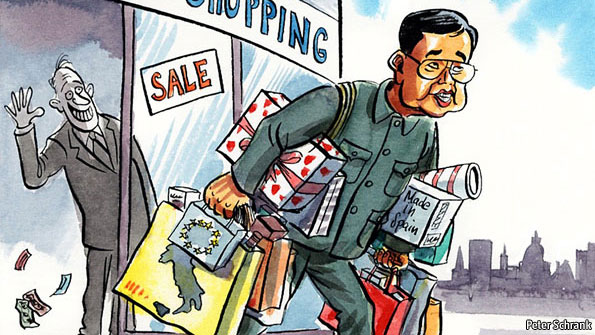
From Charlemagne, the Economist: On his tour of Europe this month, China’s vice-premier, Li Keqiang, announced his country’s plan to buy cheap European government bonds, as Chinese companies purchased shares in European petrochemical ventures, tens of thousands of cars and even a few million euros’ worth of Spanish wine and ham to top off the shopping basket. …
Writing in El País, Mr Li held out the prospect of “colossal” business opportunities for Spain: “If each of the 1,300 million Chinese people consumed a bottle of olive oil or enjoyed a few glasses of wine, all of Spain’s annual production would probably not be sufficient to meet the demand.” The newspaper reported that Spain had greeted Mr Li as a “new Mr Marshall”, an allusion to the American secretary of state who gave his name to the post-war reconstruction programme in Europe. Last October the Italian authorities put up Chinese lanterns and bathed Rome’s Colosseum in communist red light to welcome Mr Wen. It is a sign of how fast China is rising, and how quickly Europe has fallen behind, that European leaders should cling for salvation to a country that, however big, has an economy one-third the size of the European Union’s.
Nor is it obvious that China’s money is helping to buy European sympathy. …
If anything, there has been a marked sharpening of Europe’s tone towards China over economic issues: the value of the yuan, European firms’ access to the Chinese market, restrictions on the export of rare-earth minerals essential to high-tech industries and China’s acquisition of western intellectual property, by fair means or foul. In France spooks have been called in to investigate whether China was behind the espionage that targeted Renault’s electric-car technology. Europe and America are both boosting their cyber-defences in large part because of the vast scale of suspected Chinese electronic snooping.
Even a largely pro-market body like the European Commission, which regards abolishing trade barriers inside Europe as a sacred task, is starting to make protectionist noises about China. Antonio Tajani, the industry commissioner, has called for the EU to vet foreign investments that may “represent a danger”. This was prompted by the (failed) attempt by a shadowy Chinese company to take over a Dutch maker of fibre-optic cables. The trade commissioner, Karel De Gucht, is preparing possible retaliatory measures against China if it does not open up more of its government contracts to European bidders. One reason for this was Poland’s decision to award a Chinese firm a contract to build a section of a motorway part-funded by the EU. (graphic: Peter Schrank/Economist)
Image: economist%201%2016%2011%20China.jpg
